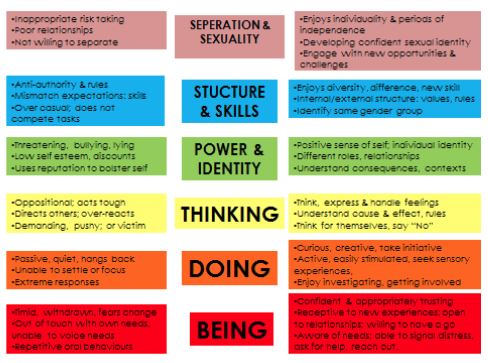
05 Jun Understanding emotional development
Typically developing children naturally progress through the different stages of emotional development and become confident, trusting, accepting young people who embrace diversity and become independent learners. However, emotional development involves many complex stages which can be hindered with inconsistent parenting, lack of sensitivity or nurture, and or difficult life events.
The following table shows how typically developing children mature emotionally when compared to non-typically developing children. This process begins from birth and matures across the lifespan to age 18. The first five stages in particular occur between the ages of 0 and 12 years. From the table, you will recognise how some young people you teach become stuck in various developmental stages along the way. Power and identity is the most common area, which typically occurs between the ages of 3 and 6 years, although I know many 14 year old boys who are still presenting in this stage as you may do too! It becomes apparent that age isn’t just a number for some of our children and young people, it is a state of emotional development.

Hindered emotional development also negatively impacts on many other psychological concepts, including moral reasoning and self-regulation. When children and young people feel that they not making the right choices, like their peers, this also affects self-esteem and in turn resilience which highlights how important this area is for young people’s engagement in learning and quality of life.
Little actions that can help in a big way:
- Apply a nurturing ethos in your classroom
- Listen to young people without judgement
- Ask rather than tell
- Reiterate do’s rather than don’ts
- Be very clear about instructions and sanctions as this allows young people take up time to process what will happen either way and supporting correct behaviour choices
- Celebrate mistakes as part of the learning process and use them to educate when possible even when applying sanctions
- Use language carefully “I don’t care about why you were late” means “I don’t care about you”
- Find the good whenever you can and praise as much as possible
- Keep your expectations high and nudge them towards the behaviour that you require through positive modelling
- Remember that young people rarely remember what you say but they will never forget how you make them feel
Next time: Raising self-esteem in the mainstream classroom setting.


